
-
Find the right food for your pet
Take this quiz to see which food may be the best for your furry friend.
Find the right food for your pet
Take this quiz to see which food may be the best for your furry friend.
Featured products
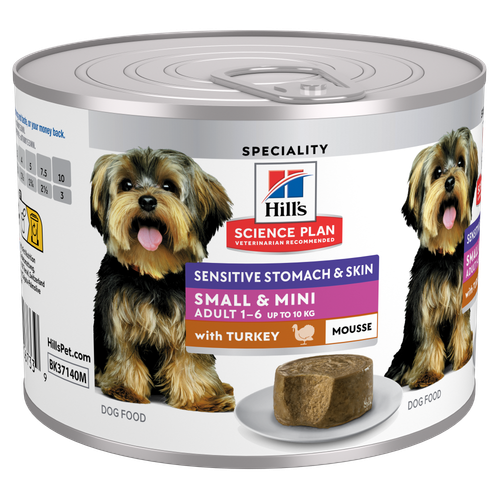 Sensitive Stomach & Skin Small & Mini Adult Dog Food
Sensitive Stomach & Skin Small & Mini Adult Dog FoodHill's Science Plan Sensitive Stomach and Skin Small & Mini Adult Dog Food with Turkey is a complete premium pet food for small breed adult dogs aged 1–6 years. This deliciously soft mousse is enriched with ingredients that support digestive health & skin care.
Shop Now Perfect Weight Adult Small & Mini Breed Dog Mousse with Turkey
Perfect Weight Adult Small & Mini Breed Dog Mousse with TurkeyChicken recipe, small breed dry dog food with for the weight support and balanced nutrition for overall health. With small kibble size for tiny mouths, quality protein for lean muscle.
Shop Now Adult Multipack Wet Dog Food with Chicken, Turkey & Beef
Adult Multipack Wet Dog Food with Chicken, Turkey & BeefHill's Science Plan Adult Dog Food Variety Pack is composed of 12 loaf cans: 6 with Chicken, 3 with Beef & 3 with Turkey. It is a complete pet food for adult dogs 1–6 years old.
Shop NowFeatured products
 Sterilised Adult Cat Food
Sterilised Adult Cat FoodHill's Science Plan Sterilised Adult Dry Cat Food with Salmon has a unique weight management formula to help burn fat, build muscle and keep sterilised cats lean. Made with high-quality, easy-to-digest ingredients.
Shop Now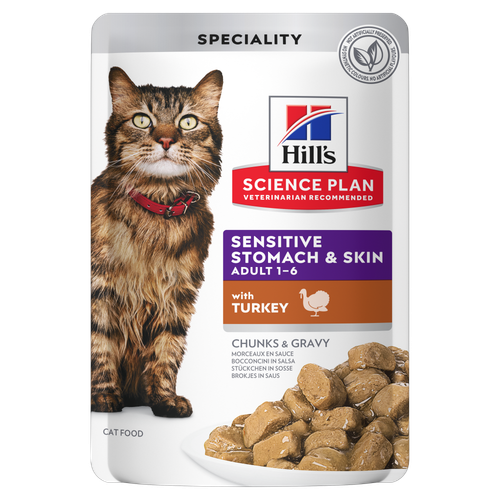 Sensitive Stomach & Skin Adult Cat Food
Sensitive Stomach & Skin Adult Cat FoodHill's Science Plan Sensitive Stomach & Skin Adult Wet Cat Food with Turkey is a complete pet food for adult cats, aged 1–6 years. This highly digestible wet food comes in a pouch and supports healthy digestion, as well as nourishes skin and promotes a thick and lustrous coat.
Shop Now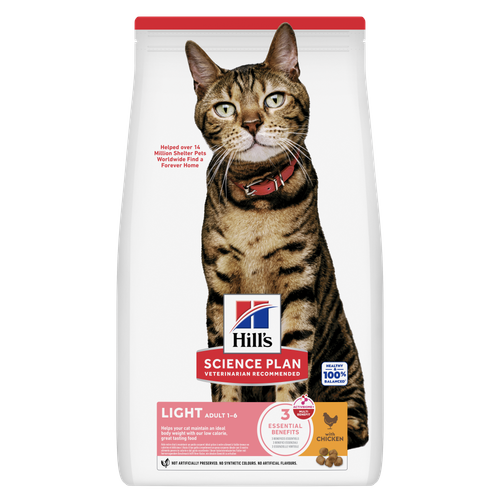 Light Adult Cat Food
Light Adult Cat FoodChicken recipe dry cat food with L-carnitine and fewer calories for ideal weight management in adult cats. Packed with high-quality protein, omega-6s, and vitamin E for shiny fur and healthy skin.
Shop Now -
Dog
- Dog Tips & Articles
-
Health Category
- Weight
- Food & Environmental Sensitivities
- Urinary
- Digestive
- Joint
- Kidney
-
Life Stage
- Puppy Nutrition
- Adult Nutrition
- Senior Nutrition
Cat
- Cat Tips & Articles
-
Health Category
- Weight
- Skin & Food Sensitivities
- Urinary
- Digestive
- Kidney
-
Life Stage
- Kitten Nutrition
- Adult Nutrition
Featured articles
 Proteins
ProteinsTo make a protein, amino acids are linked together in a long chain. The chain is then bundled into to a three-dimensional structure, like a tangled ball of yarn.
Read More The Incredible Science Behind Your Pet's Microbiome
The Incredible Science Behind Your Pet's MicrobiomeLearn what your pet's microbiome is, how it contributes to your pet's gut and overall health, and why nutrition is important in maintaining healthy microbiomes.
Read More The Right Diet For Your Pet
The Right Diet For Your PetIn people, the right diet is very important. If you are eating the wrong way for your metabolism, activity level, age and lifestyle you could end up with health issues.
Read More -
Find the right food for your pet
Find the right food for your pet
Food & environmental sensitivities in dogs
Food & environmental sensitivities in dogs
Does your dog have signs of food or environmental sensitivities?
Dry, itchy skin is just one of the many symptoms that may indicate your dog is experiencing a bigger problem brought on by environmental sensitivities. In rare cases, these may also be signs of food sensitivities in dogs. These signs can be long-term, recurring, and should be noted to your vet.
















What causes sensitivities in dogs?
One of the most difficult things on a dog’s path to recovery is determining what is causing their reactions. There are two main types of sensitivities that dogs face: food and environmental. The majority of sensitivities in dogs are from environmental causes, but certain ingredients in food may cause reactions as well.
What causes sensitivities in dogs?
One of the most difficult things on a dog’s path to recovery is determining what is causing their reactions. There are two main types of sensitivities that dogs face: food and environmental. The majority of sensitivities in dogs are from environmental causes, but certain ingredients in food may cause reactions as well.


Environmental sensitivities
Recurring signs of environmental sensitivities may be caused by grasses, pollen or biting insects. They can be addressed with a multimodal treatment including medication to help reduce the immediate symptoms and nutrition for effective long-term management.


Environmental sensitivities
Recurring signs of environmental sensitivities may be caused by grasses, pollen or biting insects. They can be addressed with a multimodal treatment including medication to help reduce the immediate symptoms and nutrition for effective long-term management.


Food sensitivities
Food sensitivities in dogs are actually very uncommon — in fact, only 10% of dogs experience food sensitivities! [1] Rarely, however, some dogs may experience reactions to certain ingredients, and they are identified through food elimination trials conducted by your veterinarian. A food elimination trial is a process of finding and removing the food ingredient causing skin issues or digestive upsets.


Food sensitivities
Food sensitivities in dogs are actually very uncommon — in fact, only 10% of dogs experience food sensitivities! [1] Rarely, however, some dogs may experience reactions to certain ingredients, and they are identified through food elimination trials conducted by your veterinarian. A food elimination trial is a process of finding and removing the food ingredient causing skin issues or digestive upsets.
Managing a dog’s sensitivities
Managing a dog’s sensitivities can be a challenging process, and your first step should be visiting your veterinarian. They will help you find the right combination of nutrition, medication, and/or topicals for your dog.


Living with a dog with food or environmental sensitivities can cause you both to be restless, but the road to improvement will require time, patience and trust in your vet. Remember — just like humans, every dog is unique, and the best solution will come from working with a professional to address your pet’s specific needs. Together, you’ll get on the right track to helping your best friend feel like their best self.


Clinical nutrition plays an important role in the long-term management of sensitivities in dogs. The right nutrition can promote healthy skin from within and help alleviate your dog’s signs. Even with treatment, some dogs may have recurring signs that will require adjustments along the way, and your veterinarian will be a helpful resource in managing your dog’s sensitivities.


A vet may prescribe medication to help alleviate your dog’s signs of sensitivities. If you are wondering what you can give your dog for sensitivities, only give medication as recommended by your vet.


Topicals can be used for managing skin conditions in dogs. There are various deliveries for topicals like shampoos, lotions, sprays or ointments. Reach out to your veterinarian to ensure a specific topical is appropriate for your pet’s skin condition and life stage.


Understanding nutritional support for food and environmental sensitivities
You’ll want to ask your vet about a few things when it comes to the suitable dog food for food or environmental sensitivities. For food sensitivities, ask about clinical dog food with a single novel protein or hydrolysed protein that is unlikely to cause a reaction. For environmental sensitivities ask about nutrition that can nourish and help protect from environmental irritants.
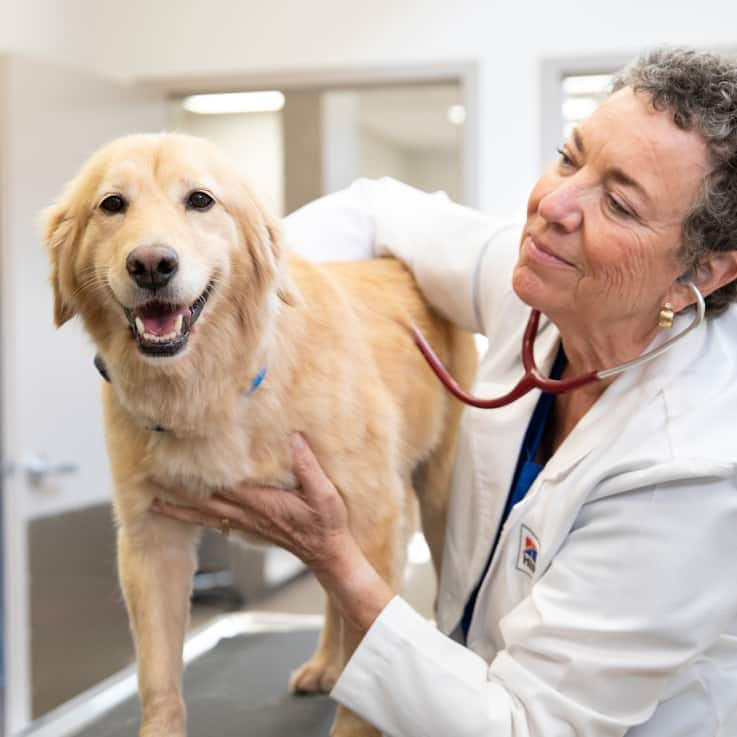

Time to see a veterinarian?
If you notice behaviour changes or sense something is off with your dog, it may be time to schedule a vet visit.
You also may want to ask your vet if clinical nutrition would be appropriate for your dog. Hill's Prescription Diet foods are developed by a team of Ph.D. nutritionists and veterinarians, and require a vet recommendation for purchase. Schedule an appointment so your vet can assess your pet's health and nutritional needs.
Talk to your vet about which nutrition is right for your pet.
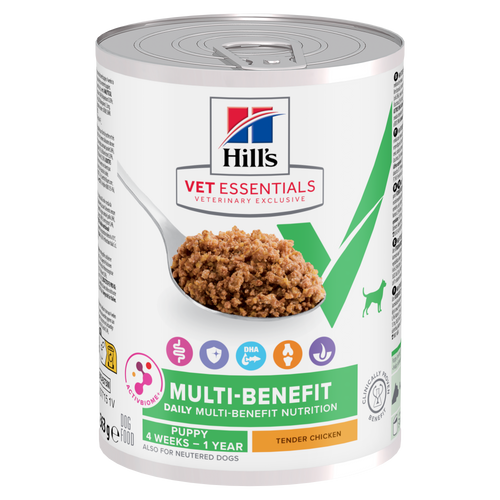
Hill's Vet Essentials Multi-Benefit Puppy wet dog food with tender Chicken (in a can for Small & Mini and Medium breed puppies up to 12 months old) is vet-exclusive, multi-benefit nutrition clinically proven to support your puppy's growth and developmental needs. For healthy digestion and well-being, our ActivBiome+ prebiotic blend nourishes their developing microbiome and is formulated with omega-3s to support brain development and antioxidants to support a developing immune system — for a better today, and many more tomorrows.
With nutritional benefits that are comparable to our dry food, wet foods can help increase your pet’s water intake and are a great way to satisfy your dog’s need for variety, with many ways to mix wet and dry foods.
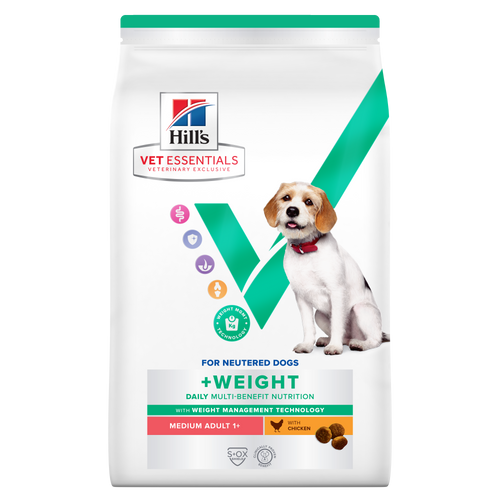
Chicken recipe dry dog food for medium breed dogs after neutering, helps support digestion and joint health. With unique weight-management technology to help reach & maintain optimal weight.
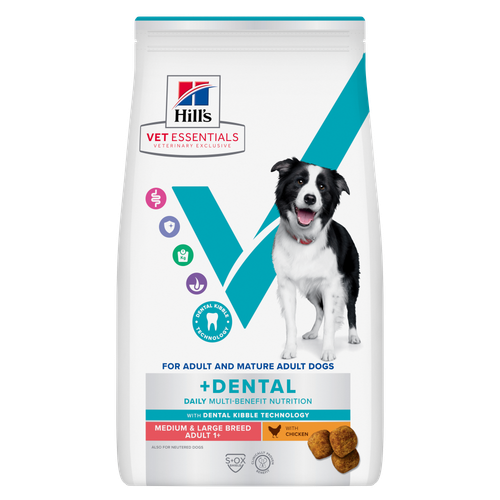
Chicken recipe dry dog food for medium breed dogs, with Dental Kibble Technology that helps reduce plaque & tartar buildup, and helps freshen breath and keep gums healthy as pets chew.
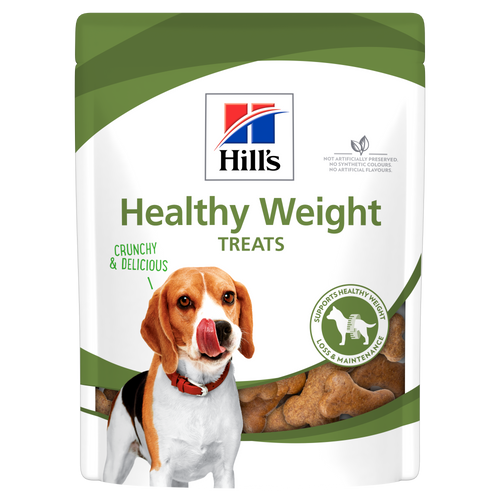
Hill's Healthy Weight Dog Treats - a tasty, complementary pet food formulated for adult dogs over the age of 1 to support healthy weight loss and maintenance.

